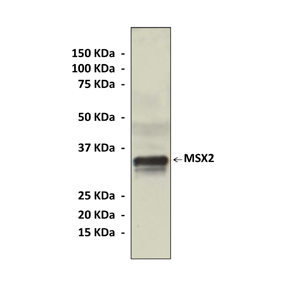Anti-MSX2: Rabbit MSX2 Antibody
Rabbit MSX2 Antibody: Rabbit MSX2 Antibody
Size: 100 ul
Price: $385.00
Description
Msx2 is a major regulator of developmental pathways during embryogenesis of different organs including craniofacial structures, limb, neural tube and mammary gland. In all these different tissues, Msx2 is expressed at the sites of epithelial-mesenchymal inductive interactions mediating the signaling between the two different tissues. In the mammary gland, Msx2 expression is hormonally regulated and promotes early branching morphogenesis of the mammary epithelium.2 Mutations in the muscle segment homeobox 2 (Msx2) homeodomain which cause loss or gain of Msx2 DNA binding activity can both result in cranial defects. Msx2 function can also be affected by subcellular localization and protein-protein interactions. Homeobox genes, when deregulated, can contribute to carcinogenesis and Msx genes may be deregulated in many types of epithelial cancers such as mammary carcinomas. MSX2 has been implicated to have a role in breast and pancreatic cancer. Studies showed that increased Msx2 results in improved outcome for breast cancer patients, possibly by increasing the likelihood of tumor cell death by apoptosis. Moreover, it was shown that MSX2 may be an important regulator of melanoma cell invasion and survival. Cytoplasmic expression of the protein was identified as biomarker for good prognosis in malignant melanoma patients.3
2. di Bari, M.G. et al: J. Cell. Physiol. 219:659–66, 2009
3. Gremel, G. et al: Br. J. Cancer 105:565-74, 2011
Details
| Cat.No.: | CY1121 |
| Antigen: | Purified recombinant human MSX2 proteins expressed in E. coli. |
| Isotype: | Rabbit IgG |
| Species & predicted species cross- reactivity ( ): | Human, Mouse, Rat |
| Applications & Suggested starting dilutions:* | WB 1:1000 – 1:10000 IP n/d IHC n/d ICC n/d FACS n/d |
| Predicted Molecular Weight of protein: | 30 kDa |
| Specificity/Sensitivity: | Detects MSX2 proteins without cross-reactivity with other family members. |
| Storage: | Store at -20°C, 4°C for frequent use. Avoid repeated freeze-thaw cycles. |
*Optimal working dilutions must be determined by end user.




